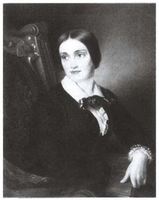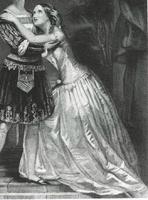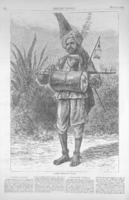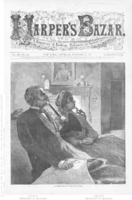"Charlotte Cushman," Harper's Bazaar, Nov 14, 1874
Dublin Core
Title
"Charlotte Cushman," Harper's Bazaar, Nov 14, 1874
Subject
Cushman, Charlotte Saunders, 1816-1876
Actors and Actresses
Actors and Actresses--US American
Praise
Intimacy--With Readers/Addressees
Gender Norms
Illness
Muspratt, Susan Cushman, 1822-1859
England--London
Relationships--Networks
Reputation
Italy--Rome
Description
The article summarizes Charlotte Cushman's "brave career." According to the author, Cushman could "exhibit her grand queenliness, her womanly sweetness and dignity." Cherishing most of her performances, the article criticizes the applause she received for playing Romeo: "Quite as hearty, if rather malapropos, was the approval which she received one night in Dublin while playing Romeo."
Cushman is characterized as a "brave" and "generous" woman.
Cushman is characterized as a "brave" and "generous" woman.
Credit
Publisher
Harper & Brothers
Date
1874-11-14
Type
Reference
Article Item Type Metadata
Text
CHARLOTTE CUSHMAN.
IT must always be a delicate task to write a biography of a living member of the fellowship of illustrious men and women. The probability of the praise or blame being read by its object must make the writer fearful lest the one seem fulsome or the other harsh, and so the generous tribute to those who hold a lofty place in the ranks of genius is often restrained by the timidity and shyness which are so apt to attend deep and earnest admiration. When to a nation's pride in the possession of a great artist or author are added individual esteem and affection, surely we may look on the recipient of such feelings as having attained the very brightest success success in that best and sweetest form, which may be worn as it has been won, untarnished by the breath of wrong or suffering caused in its acquirement to any human soul. Such a well-earned fame belongs to-day to the subject of the picture on our first page Charlotte Cushman, the greatest American dramatic artist. She has possessed it for many years, for the earlier steps of her career belong almost to the first chapters of the history of the drama in this country. The incidents of her life, her struggles and her indomitable courage, have been too often noticed to need more than a slight reference in this sketch. Born in Boston July 23, 1816, she became, while yet hardly more than a child, an important help to her mother, who had been obliged to take upon herself the task of maintaining her young family. The Woods, who forty years ago were the reigning stars of opera, met with Miss Cushman, who was just then making a brave fight for education and position as a singer. Coming one morning to sing at Mrs. Wood's rooms, she chose some simple ballad, which she sang without conscious effort. At its close the artist listener testified to the power of the songstress by streaming tears. She hastened to call her husband to hear this strangely moving voice, and his eyes also filled at the deep melody, the intense feeling, of Charlotte's art - less singing. At the desire of the Woods she strove for a long and dreary season to train her voice, under the misfortune of utterly false and useless direction, which at last resulted in the entire destruction (for opera at least) of the grand organ by overstraining it in absurd and unnatural efforts. An irreparable calamity surely, thought the heart-broken young singer and her friends, I and yet we undoubtedly owe our great actress to this untoward circumstance. In New Orleans, where her great disappointment had met her, she, advised by a good friend, himself an actor, made her first studies for the stage, and her first appearance on it, as Lady Macbeth. Her daring was rewarded by a great success. She repeated the play for many nights, and returned to New York with high hopes of fame and independence. Here her real struggles began. In their process her love and affinity for Shakspeare and the great dramatists unfolded. Through hardships, disappointments, sickness of heart and of body, she toiled on, never losing faith in herself, never bating one jot of her high aim and purpose, never taking one backward step in her brave career. When at last the reward came, recognition and appreciation to her heart's content, it left her unspoiled, unaffected, and still aspiring to greater excellence in her art. Hers was always that "noble discontent" which is never satisfied with its own attainments. The training in the first steps, the artistic mechanism, if one may so call it, had not been within her reach, and she felt very keenly the want of it through her long years of toiling after the formula of her art. Her only helpers were her own intuitions, her experiments, and her mistakes, which, after all, are effective and enduring, if somewhat rugged, teachers. To quote Miss Cushman's own words, when at the time of the great French actress Rachel's appearance here Miss C. was among her warmest appreciators, "I used to look on in a perfect rapture of wonder and admiration at her unapproachable art, and often as I left the theatre, and compared my own acting with hers, despair took possession of me, and a mad impulse to end life and effort together." We have in this ingenuous confession a key to her whole character ; in it no mean envy, no unworthy depreciation of rival talent, ever found place. Quick to perceive and generous to recognize merit in others, she has ever given instant encouragement and hearty sympathy to the workers for and in art whom she has met. Her reverence for her own art and her love for it are unbounded. To two young girls just beginning their career in art she said, lately, "I think I love and revere all arts equally, only putting my own just above tho others, because in it I recognize the union and culmination of all. To me it seems as if when God conceived the world, that was Poetry; He formed it, and that was Sculpture; He colored it, and that was Painting, and then, crowning work of all, He peopled it with living beings, and that was the grand, divine, eternal Drama." Of the great dramatic impersonations of Char - lotte Cushman it is hardly necessary now to speak. In Queen Katharine, in Shakspeare's Henry the Eighth, she could exhibit her grand queenliness, her womanly sweetness and dignity. Lady Macbeth, awful in her daring crime and her remorse, in the broken-hearted despair of the wife who had done all and lost all for the husband whose ruin was the only result; "The Wife," in Milman's tragedy ; Julia, in The Hunchback; Lady Teazle, and very many of the more modern dramatic heroines, proved her great versatility; and these impersonations must live in the memories of too many lovers of the drama to need more than a passing allusion to bring them freshly to mind. Her great vigor of mind and power of adaptation were best displayed in the male characters of Cardinal Wolsey and Romeo ; and her Meg Merrilies, in the musical drama of Guy Mannering, was an entirely fresh and original conception. Her first trial of it was made without study, without rehearsal, or suggestions from any source. While the great English ten - or, Braham, was starring in New York as Ber - tram, in Guy Afanneriny, the lady who had the role of Meg Merrilies took suddenly ill. The manager appealed to Miss Cushman to take the part at a moment's notice. Then, as always, her own pleasure and convenience were waived when she was called on to do a generous or helpful act : she went early to the theatre on the evening of the play, hastily selected or contrived some suitable " rags," and, finding a deserted quarter behind the scenes, began a rapid study of Meg. The thought suddenly came to her, " If Bertram, the nursling of tho old gypsy, is now a grown man, surely Meg will not be the hale, erect woman they all make her out to be. I must certainly put more truth into my Meg. " When the moment of her entrance came, Braham stood expecting the usual conventional Meg Merrilies; but the first words of the old gypsy caused him to start in veritable, unacted surprise. He turned to see a weird being, wrinkled, bent, hollow-eyed, a staff clutched in her skeleton hand, a wonderful costume of tatters and faded colors, yet withal a presence of power and grandeur, a dignity and command in speech and voice. No wonder it roused the great tenor to new efforts. After the curtain had fallen on the first act, Miss Cushman hurried to her dressing-room to con the remainder of the part. A knock came to her door, and her maid announced Mr. Braham. "O Heaven!" thought the daring yet timid actress, "has he come to overwhelm me with his anger at what I have done?" But a kind hand pressed hers, and warm thanks from the great singer for having given him the most delighted surprise, the most pleasurable sensation, were a sweet reward to the new and hence - forth the only Meg Merrilies of the stage. " Oh !" said Braham, "had you done to-night's work on a London stage, your fortune would be made!" Quite as hearty, if rather malapropos, was the approval which she received one night in Dublin while playing Romeo. When in the banishment scene she fell prone on the floor, taking the measure of an unmade grave," she waited there for the great burst of applause to subside. When the house was quite still a voice from the gallery, in a fine Irish brogue, accompanied by a ringing smack of the hands, called out, "Bra-vo, Char-let" to the prostrate Romeo's intense amusement. At the same play in Liverpool, while Romeo, parting from Juliet, answers her pleading, "It was the nightingale, and not the dark," by, "It was the lark, the herald of the morn, No nightingale: look, love, what envious streaks Do lace the severing clouds in yonder east," and while Romeo, with Juliet's head reclining on his breast, and hand and eyes upraised, held the house breathlessly still in sympathy with the unhappy lovers, a cry from above, agonized and guttural, but oh ! so fearfully distinct, utters, "Oh, my stummick! oh, my stummick!" Romeo, the tender words choked by a spasm of mirth, shielding as best she could the laughter which shook her sister (the Juliet), looking in the direction of that dismal cry, saw a red and puffy lad, who, leaning on the hard railing of the upper gallery, had been so borne and pressed upon by the weight of boys from the back rows that viscera, chest, and throat became one and undivided, and another moment's silent endurance utterly impossible. Romeo and Juliet's leave-taking was over before the house had recovered from the uproar of laughter caused by the outcry of the sorely put-upon boy. A long chapter would be needed for the story of Miss Cushman's life in England the tedious waiting for a fitting début, the coldness of rival actors, the reluctance and exactions of managers. But at last she found the desired opportunity. Her first appearance in London was in The Wife, and her success so splendid that her en - gagement of eight nights was changed into eighty, and her position as the first actress on the stage forever secured in England. Returning to America, she played to enthusiastic audiences. Then followed a long-period of retirement, caused at first by severe illness. Some years were spent in Rome, where she made one of the most brilliant of the distinguished literary and artistic circle there. And now for two years she has been again in her native country. With unabated power in her delightful readings, her magnificent voice has filled the Academy of Music in New York, and held in perfect attention the best and most appreciative audiences there and in all the large cities of the Union. The present season witnesses the retirement forever from the stage of our great actress, our honored country-woman, who for more than a third of a century has nobly elevated her profession, and made the name of Charlotte Cushman illustrious for her grand genius, her generous heart, and her brave and pure life.
IT must always be a delicate task to write a biography of a living member of the fellowship of illustrious men and women. The probability of the praise or blame being read by its object must make the writer fearful lest the one seem fulsome or the other harsh, and so the generous tribute to those who hold a lofty place in the ranks of genius is often restrained by the timidity and shyness which are so apt to attend deep and earnest admiration. When to a nation's pride in the possession of a great artist or author are added individual esteem and affection, surely we may look on the recipient of such feelings as having attained the very brightest success success in that best and sweetest form, which may be worn as it has been won, untarnished by the breath of wrong or suffering caused in its acquirement to any human soul. Such a well-earned fame belongs to-day to the subject of the picture on our first page Charlotte Cushman, the greatest American dramatic artist. She has possessed it for many years, for the earlier steps of her career belong almost to the first chapters of the history of the drama in this country. The incidents of her life, her struggles and her indomitable courage, have been too often noticed to need more than a slight reference in this sketch. Born in Boston July 23, 1816, she became, while yet hardly more than a child, an important help to her mother, who had been obliged to take upon herself the task of maintaining her young family. The Woods, who forty years ago were the reigning stars of opera, met with Miss Cushman, who was just then making a brave fight for education and position as a singer. Coming one morning to sing at Mrs. Wood's rooms, she chose some simple ballad, which she sang without conscious effort. At its close the artist listener testified to the power of the songstress by streaming tears. She hastened to call her husband to hear this strangely moving voice, and his eyes also filled at the deep melody, the intense feeling, of Charlotte's art - less singing. At the desire of the Woods she strove for a long and dreary season to train her voice, under the misfortune of utterly false and useless direction, which at last resulted in the entire destruction (for opera at least) of the grand organ by overstraining it in absurd and unnatural efforts. An irreparable calamity surely, thought the heart-broken young singer and her friends, I and yet we undoubtedly owe our great actress to this untoward circumstance. In New Orleans, where her great disappointment had met her, she, advised by a good friend, himself an actor, made her first studies for the stage, and her first appearance on it, as Lady Macbeth. Her daring was rewarded by a great success. She repeated the play for many nights, and returned to New York with high hopes of fame and independence. Here her real struggles began. In their process her love and affinity for Shakspeare and the great dramatists unfolded. Through hardships, disappointments, sickness of heart and of body, she toiled on, never losing faith in herself, never bating one jot of her high aim and purpose, never taking one backward step in her brave career. When at last the reward came, recognition and appreciation to her heart's content, it left her unspoiled, unaffected, and still aspiring to greater excellence in her art. Hers was always that "noble discontent" which is never satisfied with its own attainments. The training in the first steps, the artistic mechanism, if one may so call it, had not been within her reach, and she felt very keenly the want of it through her long years of toiling after the formula of her art. Her only helpers were her own intuitions, her experiments, and her mistakes, which, after all, are effective and enduring, if somewhat rugged, teachers. To quote Miss Cushman's own words, when at the time of the great French actress Rachel's appearance here Miss C. was among her warmest appreciators, "I used to look on in a perfect rapture of wonder and admiration at her unapproachable art, and often as I left the theatre, and compared my own acting with hers, despair took possession of me, and a mad impulse to end life and effort together." We have in this ingenuous confession a key to her whole character ; in it no mean envy, no unworthy depreciation of rival talent, ever found place. Quick to perceive and generous to recognize merit in others, she has ever given instant encouragement and hearty sympathy to the workers for and in art whom she has met. Her reverence for her own art and her love for it are unbounded. To two young girls just beginning their career in art she said, lately, "I think I love and revere all arts equally, only putting my own just above tho others, because in it I recognize the union and culmination of all. To me it seems as if when God conceived the world, that was Poetry; He formed it, and that was Sculpture; He colored it, and that was Painting, and then, crowning work of all, He peopled it with living beings, and that was the grand, divine, eternal Drama." Of the great dramatic impersonations of Char - lotte Cushman it is hardly necessary now to speak. In Queen Katharine, in Shakspeare's Henry the Eighth, she could exhibit her grand queenliness, her womanly sweetness and dignity. Lady Macbeth, awful in her daring crime and her remorse, in the broken-hearted despair of the wife who had done all and lost all for the husband whose ruin was the only result; "The Wife," in Milman's tragedy ; Julia, in The Hunchback; Lady Teazle, and very many of the more modern dramatic heroines, proved her great versatility; and these impersonations must live in the memories of too many lovers of the drama to need more than a passing allusion to bring them freshly to mind. Her great vigor of mind and power of adaptation were best displayed in the male characters of Cardinal Wolsey and Romeo ; and her Meg Merrilies, in the musical drama of Guy Mannering, was an entirely fresh and original conception. Her first trial of it was made without study, without rehearsal, or suggestions from any source. While the great English ten - or, Braham, was starring in New York as Ber - tram, in Guy Afanneriny, the lady who had the role of Meg Merrilies took suddenly ill. The manager appealed to Miss Cushman to take the part at a moment's notice. Then, as always, her own pleasure and convenience were waived when she was called on to do a generous or helpful act : she went early to the theatre on the evening of the play, hastily selected or contrived some suitable " rags," and, finding a deserted quarter behind the scenes, began a rapid study of Meg. The thought suddenly came to her, " If Bertram, the nursling of tho old gypsy, is now a grown man, surely Meg will not be the hale, erect woman they all make her out to be. I must certainly put more truth into my Meg. " When the moment of her entrance came, Braham stood expecting the usual conventional Meg Merrilies; but the first words of the old gypsy caused him to start in veritable, unacted surprise. He turned to see a weird being, wrinkled, bent, hollow-eyed, a staff clutched in her skeleton hand, a wonderful costume of tatters and faded colors, yet withal a presence of power and grandeur, a dignity and command in speech and voice. No wonder it roused the great tenor to new efforts. After the curtain had fallen on the first act, Miss Cushman hurried to her dressing-room to con the remainder of the part. A knock came to her door, and her maid announced Mr. Braham. "O Heaven!" thought the daring yet timid actress, "has he come to overwhelm me with his anger at what I have done?" But a kind hand pressed hers, and warm thanks from the great singer for having given him the most delighted surprise, the most pleasurable sensation, were a sweet reward to the new and hence - forth the only Meg Merrilies of the stage. " Oh !" said Braham, "had you done to-night's work on a London stage, your fortune would be made!" Quite as hearty, if rather malapropos, was the approval which she received one night in Dublin while playing Romeo. When in the banishment scene she fell prone on the floor, taking the measure of an unmade grave," she waited there for the great burst of applause to subside. When the house was quite still a voice from the gallery, in a fine Irish brogue, accompanied by a ringing smack of the hands, called out, "Bra-vo, Char-let" to the prostrate Romeo's intense amusement. At the same play in Liverpool, while Romeo, parting from Juliet, answers her pleading, "It was the nightingale, and not the dark," by, "It was the lark, the herald of the morn, No nightingale: look, love, what envious streaks Do lace the severing clouds in yonder east," and while Romeo, with Juliet's head reclining on his breast, and hand and eyes upraised, held the house breathlessly still in sympathy with the unhappy lovers, a cry from above, agonized and guttural, but oh ! so fearfully distinct, utters, "Oh, my stummick! oh, my stummick!" Romeo, the tender words choked by a spasm of mirth, shielding as best she could the laughter which shook her sister (the Juliet), looking in the direction of that dismal cry, saw a red and puffy lad, who, leaning on the hard railing of the upper gallery, had been so borne and pressed upon by the weight of boys from the back rows that viscera, chest, and throat became one and undivided, and another moment's silent endurance utterly impossible. Romeo and Juliet's leave-taking was over before the house had recovered from the uproar of laughter caused by the outcry of the sorely put-upon boy. A long chapter would be needed for the story of Miss Cushman's life in England the tedious waiting for a fitting début, the coldness of rival actors, the reluctance and exactions of managers. But at last she found the desired opportunity. Her first appearance in London was in The Wife, and her success so splendid that her en - gagement of eight nights was changed into eighty, and her position as the first actress on the stage forever secured in England. Returning to America, she played to enthusiastic audiences. Then followed a long-period of retirement, caused at first by severe illness. Some years were spent in Rome, where she made one of the most brilliant of the distinguished literary and artistic circle there. And now for two years she has been again in her native country. With unabated power in her delightful readings, her magnificent voice has filled the Academy of Music in New York, and held in perfect attention the best and most appreciative audiences there and in all the large cities of the Union. The present season witnesses the retirement forever from the stage of our great actress, our honored country-woman, who for more than a third of a century has nobly elevated her profession, and made the name of Charlotte Cushman illustrious for her grand genius, her generous heart, and her brave and pure life.
Provenance
"CHARLOTTE CUSHMAN.", Harper's Bazaar (1867). November 14, 1874. 734-7342.
http://search.ebscohost.com/login.aspx?direct=true&db=bsi&AN=82967475&site=ehostlive&
ppid=divp0001&lpid=divl002
http://search.ebscohost.com/login.aspx?direct=true&db=bsi&AN=82967475&site=ehostlive&
ppid=divp0001&lpid=divl002
Location
NYC, NY, US
Geocode (Latitude)
40.7127281
Geocode (Longitude)
-74.0060152
Social Bookmarking
Geolocation
Collection
Citation
“"Charlotte Cushman," Harper's Bazaar, Nov 14, 1874,” Archival Gossip Collection, accessed April 25, 2024, https://www.archivalgossip.com/collection/items/show/406.







